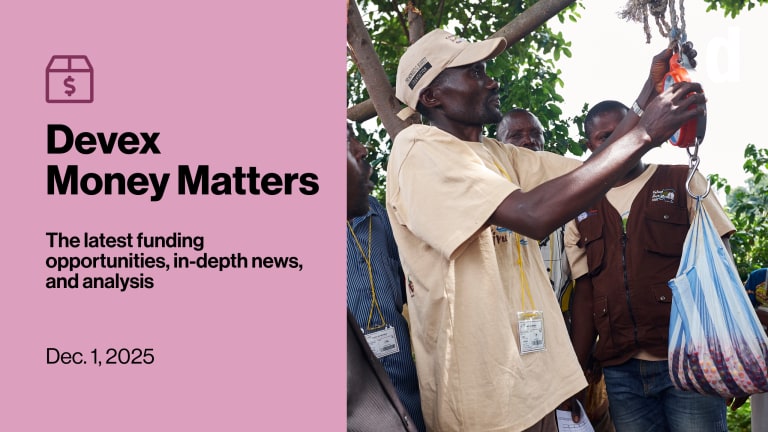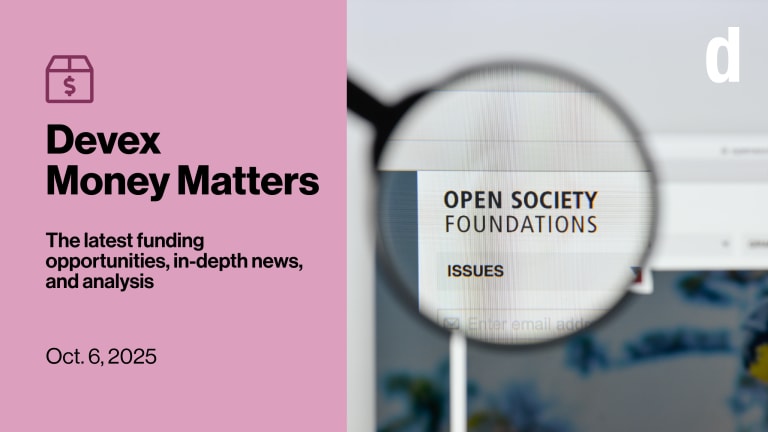
Increasingly, the global south is demanding control over its own aid budgets. But only a minority of total official development assistance, or ODA, is delivered in a way that gives low- and middle-income countries a substantial say.
Meanwhile, those same countries are increasingly looking at funding those income streams through their own tax revenues.
Among the challenges these countries face with growing their tax revenue, one looms large on the horizon: the cost of their debt, which is eating up ever more of those revenues.
We look at all three of these trends this week.
Also in today’s edition: U.S. President Donald Trump takes aim at philanthropy, a U.K. contractor shuts its aid arm, and how new accounting rules could save nonprofits millions.
+ Are there topics you want to read more about in Money Matters? We want your feedback.
Substantial say
The global north spent well over $200 billion on aid last year, but a lot of that wasn’t spent in ways that the global south is particularly interested in. A lot of it never left the shores of donor countries, being spent instead on refugees.
In total, just under $77 billion was delivered as what the OECD calls “country programmable aid,” or CPA — aid spent in an LMIC, where that country’s government has “a substantial say” in where the money goes.
So who got the money? In cash terms, the most aid went to Ukraine, followed by India. The countries which received the highest percentage of aid as CPA were all small island states, likely because the small size of these jurisdictions means that setting up externally led programs is not cost-efficient.
We’ve got an interactive visualization to help you understand more.
Read: How much aid actually reaches low- and middle-income countries? (Pro)
+ On Nov. 4, we’ll be speaking with two African philanthropy leaders to gain insights into what trust-based, long-term philanthropy looks like when it’s rooted in the communities it supports. Register here to join us.
Funding activity
We publish tenders, grants, and other funding announcements on our Funding Platform. Here are some of those most viewed in the past 10 days.
French development agency AFD has launched a call for expressions of interest for the provision of environmental, biodiversity, and social assessments in Tanzania.
The European External Action Service has launched a €6 million ($7 million) initiative to help improve energy efficiency and promote renewable energy use in Bosnia and Herzegovina.
Global Affairs Canada has launched a call for proposals to enhance inclusive economies, particularly for women and youth, in Ghana.
The government of the Netherlands has announced €209 million ($244 million) to boost women’s entrepreneurship, combat gender-based violence, and strengthen women’s leadership in peacebuilding across Africa.
Swedfund announced $10 million of funding to accelerate access to banking and digital payment solutions for underbanked micro, small, and medium-sized enterprises in Nigeria.
The United Nations is seeking proposals to investigate the heat stability of critical health products under climate change scenarios worldwide.
+ Stay ahead in this crucial time for global development by signing up for a Devex Pro Funding membership today and gain unlimited access to the latest funding opportunities from top donors as well as the industry intelligence to win them. Sign up with a five-day free trial now.
Tax planning
In the face of shrinking budgets, the new hot term this year is “domestic resource mobilization.” It’s a perhaps unnecessarily technical way of saying that countries can — and arguably should — pay for their own development via their own tax systems.
The problem is that most poorer countries don’t raise much income through tax — around 15% of the value of their GDP, compared to 40% in a typical global north country. That’s partly because their citizens are poor; most wouldn’t pay tax at all in the United States or Europe. And it’s partly because it’s hard to build the infrastructure to actually raise taxes.
But slowly, that’s changing.
“Tax is already the primary source of financing for lower-income countries, but as aid budgets continue to shrink, it will also increasingly be the linchpin of development finance,” Vanessa van den Boogaard, research fellow at the International Centre for Tax and Development, said during a Devex Impact House event on the sidelines of the World Bank and International Monetary Fund annual meetings. “We are firmly in the tax era of development.”
Read: The ‘tax era’ of development takes shape amid shrinking aid
ICYMI: Why ‘tax is the only exit strategy from aid in the long term’
Framework agreement
Meanwhile, the big barrier for many global south economies remains the amount of debt they face. Having been pushed into borrowing during the pandemic, LMICs were then hit with big increases in costs due to the war in Ukraine. Largely as a result of those two external shocks, the global south now faces a debt crisis worse than the one which led to international intervention 25 years ago through the Heavily Indebted Poor Countries initiative.
There has been some hope after the G20 issued a communiqué last week, reaffirming their support for the Common Framework, the existing G20 mechanism for debt relief. But support for the framework is limited. Critics say it’s too slow, too limited, and too creditor-friendly.
Read: G20 recommits to debt relief — but critics say it’s far from enough
Philanthropy misanthropy
The Trump administration has taken several steps in recent weeks to limit the power of nonprofits and philanthropies, including taking aim at some individual organizations by name, most notably the Open Society Foundations.
The attacks have had various strands, including changes to the tax laws and attempts to use anti-terror legislation. The sector has so far pushed back relatively vigorously, but many see what’s happened so far as no more than the opening salvos. Devex contributor Rebecca Root digs into the details.
Read: What is Trump doing to US nonprofits and philanthropies? (Pro)
Background: Trump’s scrutiny of nonprofits escalates, with Soros’ OSF at the center
Closed door
One of the largest U.K. contractors has shut down its development division in the face of falling spending from the U.K. government.
Mott MacDonald, through its subsidiary Cambridge Education, has provided aid services for more than 40 years. But a redundancy process is now understood to be underway for 500 of its staff.
Read: Mott MacDonald shuts international development arm amid UK aid turmoil (Pro)
+ Interested in more funding coverage? Explore our funding insights page. If you aren’t a Devex Pro member yet, start your 15-day free trial now to access all our exclusive reporting, analyses, events, and more.
At an INPAS
Finally, here’s a nerdy but important update which should hopefully make it much easier for nonprofits in the global south to raise money and report on grants to international funders.
Up until now, each country has had its own accounting rules — and most countries haven’t had bespoke rules for nonprofits at all — which means that international NGOs have had to follow different standards, designed either for the private sector or government, in different parts of the world.
When your funders need to be able to read and understand your accounting framework in order to decide whether to give you a grant, that’s an issue.
The introduction last week of the International Nonprofit Accounting Standard, or INPAS, means there is now a common standard available. It’s a valuable step to tackling these issues, although it will still need to be adopted by each country individually.
Read: New global nonprofit accounting standard aims to save NGOs millions
Sign up to Money Matters for an inside look at the biggest stories in development funding.








